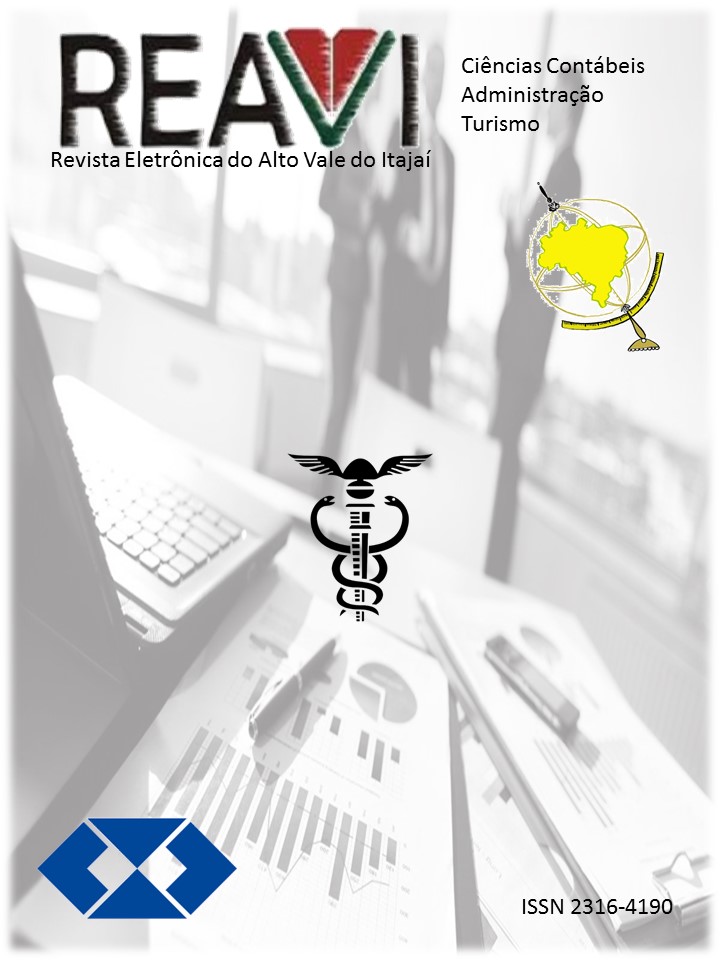A adoção de metodologias ativas e os impactos na docência: um estudo de caso na Faculdade Vale do Salgado – FVS
DOI:
https://doi.org/10.5965/2316419008122019001Palavras-chave:
Metodologias Ativas, Docentes, Ciências ContábeisResumo
Muitas instituições ainda utilizam as metodologias convencionais de ensino, como as aulas expositivas. Mas apenas essas aulas não ajudam a desenvolver o perfil profissional dos estudantes, para ajudar nessa questão existem as metodologias ativas de ensino, através delas os alunos podem aprimorar características como, a liderança e o trabalho em equipe. O mercado de trabalho está cobrando do contador mais do que apenas calcular o valor a ser pago em impostos, os gestores das empresas querem profissionais que saibam explicar a situação patrimonial da empresa, elaborar relatórios gerenciais e que sejam proativos, sendo assim, esse artigo tem o objetivo de verificar a adoção de metodologias ativas e os impactos na docência: um estudo de caso na Faculdade Vale do salgado – FVS. Para alcançar esse objetivo, realizou-se uma pesquisa com os docentes do Curso de Ciências Contábeis, onde eles responderam um questionário estruturado com perguntas objetivas e subjetivas relacionadas ao uso e conhecimento dos mesmos sobre as metodologias ativas. Os resultados obtidos demonstraram que apesar de haver um entendimento dos professores sobre a importância de utilizar as metodologias em suas aulas, a maioria dos pesquisados não as utilizam de maneira constante, grande parte respondeu que procura usar mensalmente. Apesar da abordagem da pesquisa ser limitada apenas aos docentes ela não deixou de ser relevante, pois mostrou o real entendimento dos professores em relação à adoção das Metodologias Ativas em sala de aula, e descobriram-se os benefícios que são notados nos alunos durante as aulas em que elas são utilizadas.
Downloads
Referências
BERBEL, Neusi A. N. As Metodologias Ativas e a Promoção da Autonomia dos Estudantes. 2011. Disponível em: <http://www.uel.br/revistas/uel/index.php/seminasoc/article/view/10326/10999>. Acesso em: 14 ago. 2018.
BERGMANN, Jonathan; SAMS, Aaron. Sala de aula invertida: uma metodologia ativa de aprendizagem. Tradução Afonso Celso da Cunha Serra. - 1. ed. - Rio de Janeiro: LTC, 2018.
BORGES, Tiago S.; ALENCAR, Gidélia. Metodologias Ativas na Promoção da Formação Crítica do Estudante: O uso das Metodologias Ativas como Recurso Didático na Formação Crítica do Estudante do Ensino Superior. 2014. Disponível em: <https://www.cairu.br/revista/arquivos/artigos/2014_2/08%20METODOLOGIAS-%20ATIVAS%20NA%20PROMOCAO%20DA%20FORMACAO%20CRITICA%20DO%20ESTUDANTE.pdf>. Acesso em: 08 jan. 2019.
CITTADIN, Andréia; Et al. O Uso de Metodologias Ativas no Ensino da Contabilidade de Custos. 2015. Disponível em: <https://anaiscbc.emnuvens.com.br/anais/article/viewFile/4042/4043>. Acesso em: 14 ago. 2018.
COELHO, Patrícia M. F; MOTTA, Everson L.; CASTRO, Francieli P. C. Reflexões Interdisciplinares Sobre Aplicativo Kahoot! No Ambiente Educacional. 2018. Disponível em: <http://www.periodicos.ufpb.br/ojs/index.php/actas/article/view/37831/19184>. Acesso em: 07 nov. 2018.
COSTA, Felipe. Práticas de Ensino Inovadoras e a Aprendizagem em Ciências Contábeis. 2014. Disponível em: <https://www.univates.br/bdu/bitstream/10737/783/1/2014FelipedaCosta.pdf>. Acesso em: 08 jan. 2019.
CRUZ, Maria A. A. A Formação Acadêmica do Contador dos Cursos de Ciências Contábeis do Distrito Federal e o Desempenho no Exame de Qualificação. 2013. Disponível em: <http://repositorio.uniceub.br/bitstream/235/3987/1/21005049.pdf>. Acesso em: 20 ago. 2018.
FONSECA, Reinaldo A. Et al. A Importância do Contador nas Organizações. 2014. Disponível em: <https://www.aedb.br/seget/arquivos/artigos14/32720337.pdf>. Acesso em: 08 jan. 2019.
GASPARIN, João L.; GONÇALVES, Rosilene N. Ensino Superior de Contabilidade no Brasil e a Prática Docente. 2012. Disponível em: <http://educere.bruc.com.br/arquivo/pdf2013/7147_5607.pdf>. Acesso em: 20 ago. 2018.
GUERRA, Cicero J. O. Os Impactos da Adoção de Metodologias Ativas no Desempenho dos Discentes do Curso de Ciências Contábeis de Instituição de Ensino Superior Mineira. 2016. Disponível em: <http://www.fucape.br/_public/producao_cientifica/8/Disserta%C3%A7%C3%A3o-%20C%C3%ADcero%20Jos%C3%A9%20Oliveira.pdf>. Acesso em: 14 ago. 2018.
KOUNROUZAN, Márcia C. A Qualidade do Ensino nos Cursos de Ciências Contábeis e a Formação do Contador para Atender o Mercado de Trabalho. 2011. Disponível em: <https://www.fag.edu.br/upload/arquivo/1322743420.pdf>. Acesso em: 20 ago. 2018.
KOUNROUZAN, Márcia C.; Et al. A Importância do Retorno do Exame de Suficiência. 2010. Disponível em: <http://cac-php.unioeste.br/eventos/encicon/Ensino_e_pesquisa_em_contabilidade/trab008.pdf>. Acesso em: 21 ago. 2018.
MEIRINHOS, Manuel; OSÓRIO, António. O Estudo de Caso como Estratégia de Investigação em Educação. 2010. Disponível em: <https://core.ac.uk/download/pdf/153405689.pdf>. Acesso em: 23 ago. 2018.
MONTES, Marcella R.; Et al. Identificação das Práticas Metodológicas de Ensino Aplicadas no Curso de Graduação de Ciências Contábeis a Partir do Perfil Docente. 2011. Disponível em: <https://anaiscbc.emnuvens.com.br/anais/article/viewFile/550/550>. Acesso em: 14 ago. 2018.
MORAN, José. Mudando a Educação com Metodologias Ativas. 2015. Disponível em: <http://www2.eca.usp.br/moran/wp-content/uploads/2013/12/mudando_moran>. Acesso em: 08 jan. 2019.
PRODANOV, Cleber C.; FREITAS, Ernani C. Metodologia do trabalho científico [recurso eletrônico]: métodos e técnicas da pesquisa e do trabalho acadêmico. 2. Ed., Novo Hamburgo: Freevale, 2013.
REIS, Luciano G. dos; TARIFA, Marcelo R.; NOGUEIRA, Daniel R. O Processo de Ensino da Contabilidade Custos e Gerencial: Uma Análise Comparativa entre o Ensino Presencial e o Ensino A Distância. 2009. Disponível em: <http://anaiscbc.emnuvens.com.br/anais/article/viewFile/1116/1116>. Acesso em: 05 nov. 2018.
ROMANO, Ana C. M. Aprendizagem pelos Pares: Um contributo para a sua aplicação no Ensino Secundário. 2013. Disponível em: <https://ubibliorum.ubi.pt/bitstream/10400.6/1873/1/Aprendizagem%20pelos%20-Pares%20%20Um%20contributo%20para%20a%20sua%20aplica%C3%A7%C3%A3o%20no%20-Ensino%20Secund%C3%A1rio.pdf>. Acesso em: 24 ago. 2018.
SOUZA, S. C.; DOURADO, L. Aprendizagem Baseada em Problemas (Abp): Um Método de Aprendizagem Inovador para o Ensino Educativo. 2015. Disponível em: <http://www2.ifrn.edu.br/ojs/index.php/HOLOS/article/view/2880/1143>. Acesso em: 24 ago. 2018.
TOLEDO, Jenifer V.; MOREIRA, Ucineide R. R.; NUNES, Andrea K. O Uso de Metodologias Ativas com TIC: Uma Estratégia Colaborativa para o Processo de Ensino e Aprendizagem. 2017. Disponível em: <https://eventos.set.edu.br/index.php/simeduc/article/viewFile/8529/2838>. Acesso em: 08 jan. 2019.
Downloads
Publicado
Como Citar
Edição
Seção
Licença
Copyright (c) 2019 REAVI - Revista Eletrônica do Alto Vale do Itajaí

Este trabalho está licenciado sob uma licença Creative Commons Attribution 4.0 International License.














